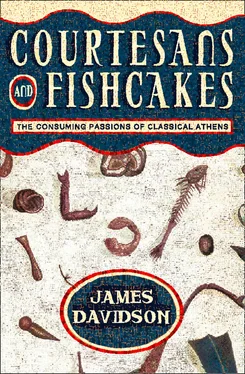COPYRIGHT
PRAISE
DEDICATION Dedication DEDICATION INTRODUCTION PART I. FEASTS I Eating II Drinking PART II . DESIRE III Women and Boys IV A Purchase on the Hetaera PART III . THE CITIZEN V Bodies VI Economies PART IV . THE CITY VII Politics and Society VIII Politics and Politicians IX Tyranny and Revolution CONCLUSION BIBLIOGRAPHY INDEX ACKNOWLEDGEMENTS ABOUT THE AUTHOR NOTES ABOUT THE PUBLISHER For D. A. D. and G. H. D .
INTRODUCTION
PART I. FEASTS
I Eating
II Drinking
PART II . DESIRE
III Women and Boys
IV A Purchase on the Hetaera
PART III . THE CITIZEN
V Bodies
VI Economies
PART IV . THE CITY
VII Politics and Society
VIII Politics and Politicians
IX Tyranny and Revolution
CONCLUSION
BIBLIOGRAPHY
INDEX
ACKNOWLEDGEMENTS
ABOUT THE AUTHOR
NOTES
ABOUT THE PUBLISHER
Introduction Contents COVER TITLE PAGE James Davidson COPYRIGHT PRAISE DEDICATION Dedication DEDICATION INTRODUCTION PART I. FEASTS I Eating II Drinking PART II . DESIRE III Women and Boys IV A Purchase on the Hetaera PART III . THE CITIZEN V Bodies VI Economies PART IV . THE CITY VII Politics and Society VIII Politics and Politicians IX Tyranny and Revolution CONCLUSION BIBLIOGRAPHY INDEX ACKNOWLEDGEMENTS ABOUT THE AUTHOR NOTES ABOUT THE PUBLISHER For D. A. D. and G. H. D . INTRODUCTION PART I. FEASTS I Eating II Drinking PART II . DESIRE III Women and Boys IV A Purchase on the Hetaera PART III . THE CITIZEN V Bodies VI Economies PART IV . THE CITY VII Politics and Society VIII Politics and Politicians IX Tyranny and Revolution CONCLUSION BIBLIOGRAPHY INDEX ACKNOWLEDGEMENTS ABOUT THE AUTHOR NOTES ABOUT THE PUBLISHER
IN THE COLLECTION of the Vatican Museums is a mosaic signed by one Heraclitus. Across a white background is an even scattering of debris: a wish-bone, a claw, some fruit, various discarded limbs of sea-creatures, the remains of a fish. It is a copy of a famous mosaic by the artist Sosos of Pergamum, called the Unswept Hall . Sosos, whom the Roman antiquarian Pliny called ‘the most renowned’ of all mosaicists, worked in the first half of the second century BCE. He specialized in illusionistic works, trying to turn the unpromising medium of coloured tiles into something lifelike and real. His most famous and remarkable work depicted doves drinking from a birdbath. You could even see their reflections on the surface of the water, says Pliny. A copy was discovered at Hadrian’s villa at Tivoli. It is indeed a fine example of what ancient artists were capable of, achieving a very real sense of the basin’s three-dimensional form and burnished metallic sheen. What is so remarkable, however, about the Unswept Hall , is not its illusionistic ambition, but its objective humility. It is a floor that depicts a floor, closing the gap between art and life. This is most obvious, perhaps, with the white tiles, which have a perfect identity with the white tiles of an unswept floor. More honest than the sipping doves, on one level it really is what it claims to be; it is a trick-floor, impossible to clean.
But the floor is not really the subject at all. The true theme is an unseen banquet, as we can tell from the strewn litter. And this feast still seems to be going on. There was a pause in Greek banquets between the eating part and the drinking part of the meal, when tables were cleared, floors swept, hands washed and perfumes splashed. Sosos’ banquet has not quite reached that stage. Moreover, some of the debris casts rather strange shadows as if it is hovering half a millimetre above the ground, as if it has a little way still to fall.
The subject of this book is similar to Sosos’ – not the ancient banquet exactly, but the pleasures of the flesh that were indulged there: eating and drinking and sex. These are the consuming passions, three varieties of bodily gratification to which the whole human race, according to Plato, was susceptible from birth. Aristotle described them as animal cravings: hunger, thirst and lust, base and servile urges with their true foundation, contrary to appearances, in the sense of touch. This accounts for the gourmand, he says, who prayed for the throat of a crane so he could enjoy his food for the longest time, as it travelled slowly down. More exactly, this book is about the pleasures of the flesh in classical Athens, because although not all the material I have used falls inside the classical period (479–323 BCE – Before the Common Era) and a little of it is not even pure Athenian, it is Athens and the Athenian democracy that provide the context.
Its material is the scraps that have fallen from the tables of ancient literature, snatches of conversation, anecdotes abruptly curtailed and stories that seem to make no sense: an explorer comes across a savage tribe on the shores of the Persian Gulf who live off bread made from fish and ‘fishcakes’ for special occasions; the philosopher Socrates visits a beautiful woman who lives in luxury with no visible means of support and refers obliquely to ‘her friends’; the guests at a drinking-party imagine they are at sea and throw furniture out of the windows to prevent their boat from capsizing; a politician makes a speech about towers and walls and finds himself accused of prostitution; a tyrant finds a lost ring inside a magnificent fish and thinks he recognizes the work of the gods, but when he tells the King of Egypt he immediately breaks off their friendship; the general Alcibiades drinks wine without water, countless statues of Hermes are vandalized in the night and Athens loses the Peloponnesian War.
One particular table has provided especially rich pickings, Athenaeus’ Dinner-sophists or Banquet of Scholars , composed at the turn of the second century of the Common Era (CE), a long work in the form of a dialogue in the tradition of Plato’s Symposium . Instead of discussing the meaning of life or the nature of love, however, Athenaeus’ guests talk only of the banquet itself, of different kinds of food and wine, of famous courtesans and boastful chefs, of cups and riddles, of a league-table of luxurious nations. They are hardly interested in their own period, concentrating on the world before the Romans arrived, particularly the world of classical Athens which had succumbed to an army of Macedonians five hundred years before. Most importantly, the guests are astonishing pedants, bolstering the most trivial comments with a formidable array of quotations from ancient literature, literature which has now almost entirely disappeared.
Very few scholars are interested in Athenaeus himself and his pernickety banquet, but the scraps from his table provide a unique resource for historians of pleasure. Ancient historians often find themselves relying on only one author for matters of the greatest importance. Thanks to Athenaeus, however, those who wish to know what the Greeks thought of crustaceans, or of various courtesans, or of the proper way to drink wine, can draw on a huge number of authors and a wide range of genres. Of course Athenaeus has his own clear predilections and his selection must not be seen as a representative cross-section of Athenian culture or Athenian literature in general. He draws especially on the comic poets and it is Attic comedy, produced each year at festivals of Dionysus, that provides the basis for much of what we know of Athenian life. Unlike the tragedies which gave up on the present early in the classical period, comedy was very much about the contemporary world and contemporary issues. It often named contemporary politicians and public figures or featured them in its plots, resorting to the world of myths and heroes only in order to parody tragic rivals or to set up incongruous juxtapositions between then and now.
Читать дальше












